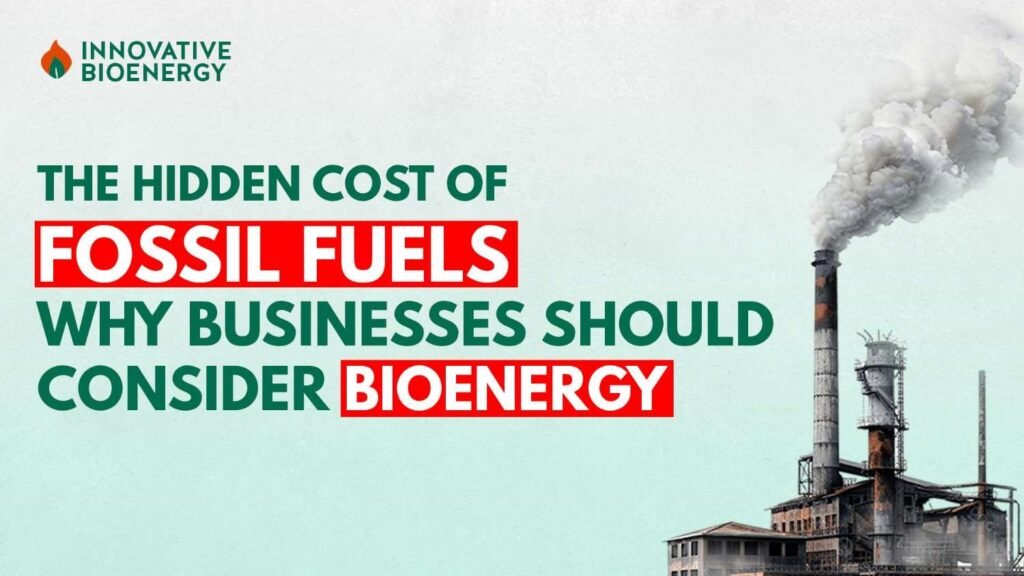Fossil fuels might appear to be a cost-effective energy solution for businesses at first glance, but this perception is misleading. The market price of fossil fuels fails to reflect the hidden costs they carry, from health issues caused by air pollution to large-scale environmental degradation and long-term climate damage. These hidden expenses impact public health, ecosystems, and economic productivity worldwide.
In fact, studies estimate globally, fossil fuel emissions caused around $28 trillion in economic damage from 1991 to 2020, harming crops, damaging infrastructure, and affecting public health.
This is where Innovative Bioenergy steps in, offering a clean energy solution that helps businesses lower costs, reduce emissions, and future-proof their operations. By replacing fossil fuels with sustainable bioenergy, companies can achieve real environmental impact while staying competitive in a rapidly changing market.
Why Businesses Should Switch to Bioenergy
So, what’s the solution? Bioenergy, a form of renewable energy made from organic materials like wood, agricultural waste, or food byproducts, is proving to be a smarter, cleaner, and more cost-effective option for companies today.
Why Bioenergy Is a Better Alternative to Fossil Fuels?
Bioenergy operates in a closed carbon cycle. That means the CO₂ released during energy use is balanced by the CO₂ absorbed by the plants used to create it. This results in clean energy production that doesn’t add new carbon to the atmosphere, a key part of fighting climate change.
This makes bioenergy a practical fossil fuel alternative that aligns with long-term sustainability goals.
Let’s break down the bioenergy benefits for commercial enterprises.
Key Benefits of Bioenergy for Businesses
1. Cost Savings on Energy
Switching to bioenergy helps reduce business energy expenses. Companies can save up to 40% on energy costs because biomass fuel is often cheaper and more stable in price than fossil fuels.
2. Better Regulatory Compliance
As governments push for sustainable energy use, relying on bioenergy helps businesses meet environmental rules and avoid penalties tied to high emissions. It also reduces exposure to carbon pricing and fossil fuel market swings.
3. Stronger Brand Image
Companies that move to green energy solutions are seen as forward-thinking and environmentally responsible. This can attract investors, win customer loyalty, and boost ESG scores.
4. Reliable Power Supply
Modern bioenergy systems provide consistent, 24/7 energy, unlike fossil fuels, which can be impacted by price hikes and supply issues.
5. Supports Local Economy
Using local waste as fuel creates jobs and encourages circular economy practices, where waste is reused rather than dumped or burned.
These industrial bioenergy solutions for companies are increasingly being adopted due to their reliability and cost-efficiency.
Environmental Impact: Cleaner Energy, Less Waste
One of the biggest environmental impacts of fossil fuels on companies is pollution. But with bioenergy, businesses reduce greenhouse gas emissions and improve waste management.
By converting waste into energy, companies create new value streams and lower their carbon footprint with bioenergy. This also helps in meeting sustainable development goals.
As environmental regulations grow tighter, bioenergy for businesses offers a cleaner path forward that aligns with ESG goals.
Businesses adopting bioenergy play a crucial role in advancing sustainable business practices while cutting emissions.
Real-World Business Examples
Many global companies are already adopting renewable energy options for companies, especially bioenergy:
- Heineken Indonesia: Achieved 100% steam generation from agricultural waste, cutting 48,000 tons of CO₂ emissions yearly.
- Danone Indonesia: Switched to biomass energy, reducing their emissions by 5,800 tons of CO₂ each year.
Locally, Innovative Bioenergy is helping businesses across Pakistan embrace a more sustainable energy future. From food processing to heavy industries, companies are using biomass pellets and organic waste solutions to replace expensive fossil fuels and improve their bottom line.
Cost Comparison: Fossil Fuels vs Bioenergy for Businesses
| Criteria | Fossil Fuels | Bioenergy |
| Price Stability | Unstable | Stable |
| Carbon Emissions | High | Low/Neutral |
| Health & Environmental Impact | Negative | Positive |
| Long-term Cost | High (due to hidden costs) | Low |
| Regulatory Risk | High | Low |
Clearly, bioenergy presents a strong business case for sustainable energy solutions.
Conclusion: The Smart Move Toward Bioenergy
The hidden costs of fossil fuels are no longer something businesses can afford to ignore. From damaging environmental impacts to rising operational expenses and regulatory pressures, fossil fuel dependence poses serious long-term risks.
On the other hand, bioenergy, especially when provided by leaders like Innovative Bioenergy, offers a clean, cost-effective, and future-ready biomass solution.
By switching to bioenergy, your business can reduce its carbon footprint, cut energy costs, and actively contribute to a greener, more sustainable world. It’s not just good for the planet, it’s smart for your bottom line.



